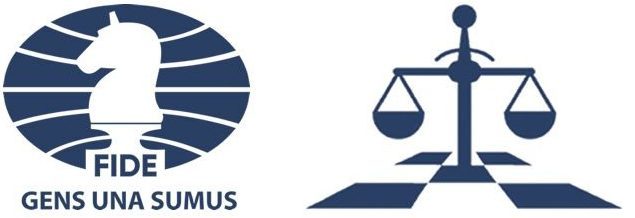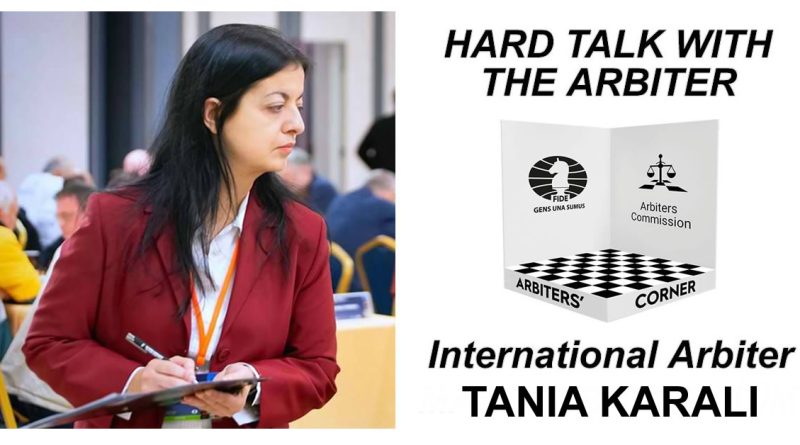HARD TALK WITH THE ARBITER – IA TANIA KARALI
Hard Talk with the Arbiter continues introducing International Arbiter Tania Karali from Greece.
1. Who is Tania Karali?
I am a Category A International Arbiter from Greece. My journey as an arbiter started in December 2010, when I passed my first seminar for National Arbiters. I became a FIDE Arbiter in 2013 and an International Arbiter in 2016. Since then, it has been a roller coaster of events and experiences, travelling to places that I wouldn’t have been in otherwise. I speak 4 languages (English, Spanish, French, Russian (and Greek, of course 🙂 )) with different levels of fluency. I have studied Applied Mathematics and I used to tutor high school students in Mathematics, Physics and Chemistry. In 2018, I started being frequently invited in various events and I couldn’t manage both, so I decided to become a full-time arbiter.
I am very passionate about what I do and I treat each event as if it is the last one that I go to, so that I enjoy it as much as possible and give my best.
I love attending seminars, sharing experience and learning new things.
I am a member of the Board of the Greek Chess Federation, Secretary of the ECU Arbiters’ Council and a member of the FIDE Technical Commission.
2. How have you progressed as an arbiter/FPO Candidate in the last 5 years?
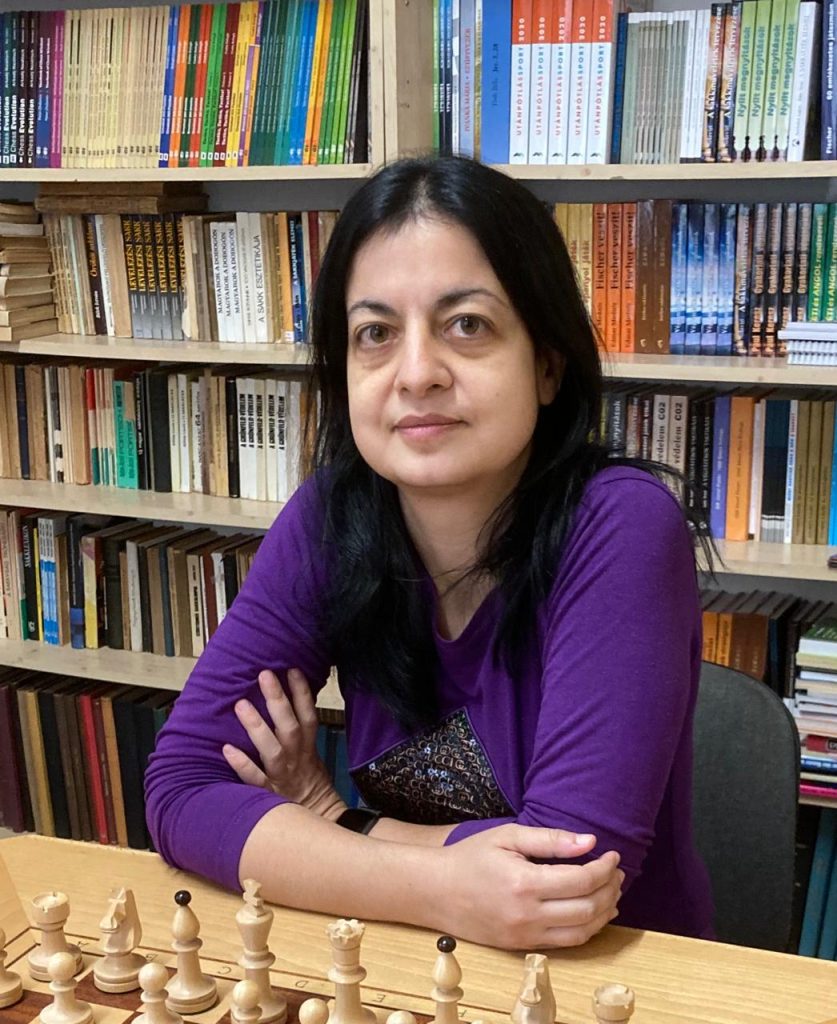
One of the events that had the greatest impact on me was the 43rd Chess Olympiad in Batumi, in 2018. It was there that I decided how I wanted my life to be, travelling, meeting new people from all around the world and gaining experience. For 1.5 year, it was going quite well, I received a few invitations and organisers started to know me and appreciate my work.
Then, covid happened and everything changed… No more travelling, most events were cancelled and we were afraid to even get out of the house. I suddenly found myself with a lot of time and energy in my hands and I needed a project to get my mind off reality. This is when I wrote the Swiss-Manager User’s Guide, a complete manual that has now been translated in 12 languages and is distributed online, free of charge. This manual was praised from the very beginning in various countries all around the globe and featured in the greatest chess websites (such as chess.com and Chessbase India).
Soon after that, ECU and FIDE started organising online events on tornelo. Tornelo was a fairly new platform at the time, it had been mostly used for events’ management in Australia, maybe also elsewhere, but never in Europe and never for online chess. I was one of the few people who started working with it from start and I kept receiving invitations for most of the online events during the pandemic.
In early 2021, I started working with chess24 and kept going for 2 years. In 2022, I was the CA of the Champions Chess Tour, organised by the Play Magnus Group on chess24, featuring some of the best players in the world, which will always be one of the most memorable experiences of my life as an arbiter.
Now that the pandemic is over and life got back to normal, I am grateful to be invited once again to prestigious OTB events, with the most important one being the 2nd leg of the Women’s Grand Prix in Munich 2023, where I achieved my final A Category norm.
Go to as many seminars as possible. You will get invaluable experience from colleagues who share incidents from their tournaments.
Tania Karali
3. What were the three positive things that your last Chief Arbiter said about you?
My last two events were the European Team Championship 2023 (Budva, Montenegro) and the European Rapid & Blitz 2023 (Zagreb, Croatia). The Chief Arbiter in both was IA Nenad Doric (CRO), nice guy, doesn’t speak much 🙂
In general, I am considered to be fast and accurate when I am working as a Pairings officer, which is the position I enjoy the most. I have had very good co-operation with all my Chief Arbiters so far, the common goal is to run a successful event. On my part, I consider it a success when the Chief Arbiter doesn’t make any negative remarks about my work and when they ask my opinion about interpretation of the regulations or how to act in specific situations.
4. Explain an occasion when you had to adapt in the face of a difficult situation (either as an arbiter or FPO Candidate)?
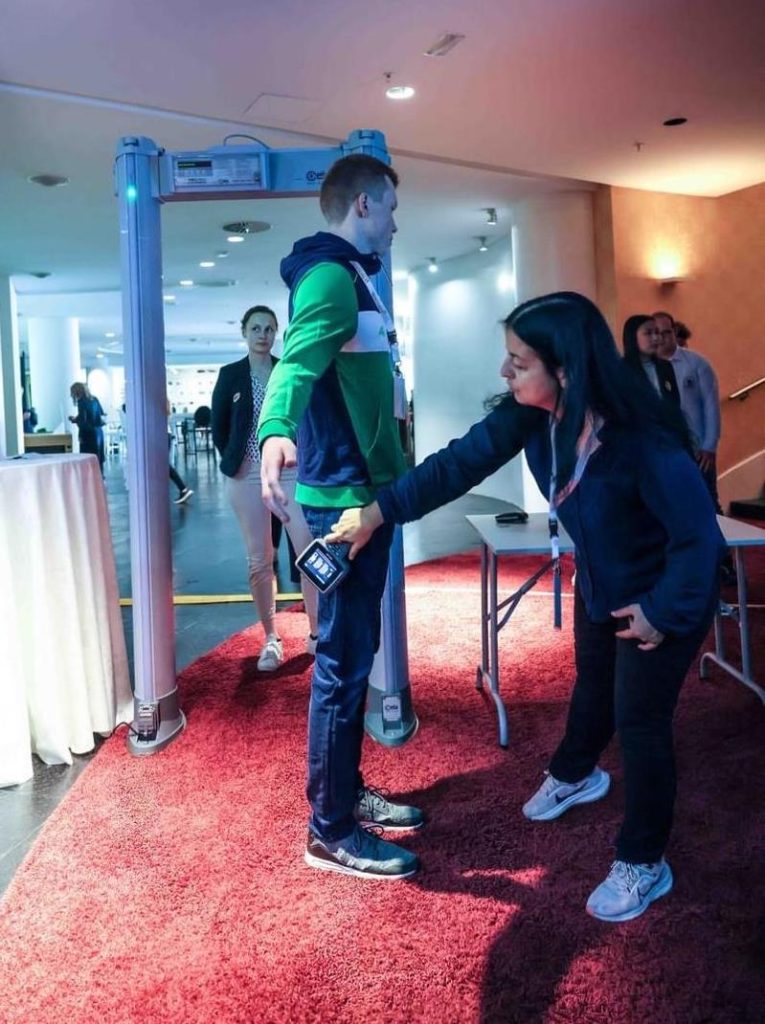
I will go back again to my early online chess times, to answer this question.
It was a period where everything needed to adapt, even maybe chess itself. Yes, the infrastructure was there, people were already playing online at a large scale and chess had a huge advantage over most other sports. However, everything was different. The players’ rooms became the playing hall, the mouse became their hand, the claims for 3-fold repetition and flag fall were taken care of by the computer automatically. The arbiters suddenly needed to be technologically competent, to handle various platforms simultaneously (tornelo/chess.com/chess24/lichess for play, zoom/skype/jitsi to supervise the players, Slack/WhatsApp/google sheets for internal communication). Not only did we need to multitask, but we also needed to explain to the players how to connect everywhere, to use second cameras and share their screens. Things like unstable internet connection, low battery or players forgetting their passwords became our nightmare 🙂
Time zones were an extra difficulty. In OTB World events, players and arbiters come together in a physical place. In online/hybrid events, what is afternoon in America can be night in Europe. Communication and preparation can be as challenging as the event itself, because you need to co-ordinate and cannot find a time that is convenient for everyone.
During that period, I was privileged to work with experienced and professional arbiters from all around the globe. Most of all, I would like to thank Melih Cicek (TUR) for his support, his amazing organisational skills, good nature and sense of humour (even in the most difficult of times).
5. What problems did you encounter in your last three events and how did you handle them?
The main recurring problem for me is handling spectators and captains (in team events) inside the playing hall. An arbiter’s first responsibility is to ensure that the players are in the best possible conditions. However, with the exception of youth events, we can have various people inside the venue, captains, players who have finished their games, coaches, even sponsors and local authorities, who are not used to being completely quiet.
Even without going into fair play matters and assuming that everyone is well-intended, speaking inside the playing venue (unless it is between arbiters or arbiters and players to solve and issue that has occurred) is totally unacceptable.
Going into fair play matters, all venues should have separate areas for spectators which should include toilets and, ideally, refreshment and smoking areas, so that they do not move in the same areas as the players. The players should be isolated as much as possible to be able to focus on their games and not worry about what might be going on around them. Unfortunately, not all venues can provide these conditions, making the arbiters’ job extra tough, as they need to monitor several things at the same time.
Even if you have an excellent knowledge of the regulations and Laws of Chess, you cannot act properly in any situation, if you do not know what exactly happened.
Tania Karali
6. What are the most common unsportsmanlike attitudes you have faced in tournaments and what were the corresponding penalties for each?
Same as in the previous question, talking inside the playing hall, sometimes even not in such a low voice. It is not only disturbing for the players who may or may not be in time pressure, it is completely rude. The penalty is expulsion from the playing venue. I have even expelled team captains who overstepped and caused such issues.
Disrespect for the arbiters is not that uncommon, but we need to consider many factors in such cases, like the player’s age, the stage of the game, time left on the clock, what led to the specific behaviour. It has happened that players who were unkind to arbiters during tension apologise once the game is over. I really appreciate such moments, it is a human reaction.
On the other hand, I have seen players getting very upset and attacking verbally their opponents after a lost game. A warning is always issued immediately, but can lead to expulsion from the event, if the player keeps behaving inappropriately.
7. In January 2022, FIDE declared 2022 the “Year of the Woman in Chess”. In that context, seven initiatives were planned to organize events and extend collaborations. Did this trickle down to the arbitration of women in major events?
I am not totally sure how to answer this question, because I lack specific data. FIDE and ECU had a quota even before 2022 for the presence of female arbiters in events, I think it is 25% for both. One very positive initiative that was repeated a few times in 2023, and I hope will keep going in the future, was organising funded FA Seminars for women. The cost of a FA Seminar can be quite high and it was nice to allow the federations to nominate their representatives who could attend free of charge.
We often speak about enhancing the female presence in arbitration, but we need to take into consideration social difficulties that women may be facing. I would say that it is much harder for a woman to travel and work in an event at short notice, leaving behind her family, work and other obligations, than it is for our male colleagues. Correct planning can ease these difficulties and give more opportunities to women to participate.
8. You have thanked Sotiris Logothetis, Mihalis Prevenios and Werner Stubenvoll for teaching you everything that you know on Swiss-Manager and for always being there for you to answer all of your questions, even the simplest ones. Are you open to teach or answer any questions regarding Swiss-manager even though you have written a guide about it?
For me, being an arbiter is all about sharing experience. Attending seminars, exchanging stories about incidents that occur and asking for opinions is the only way to move forward and raise the level of arbiters as a whole. Many colleagues have contributed in my gaining of knowledge in various aspects of chess arbitration and it is now my turn to try and give something back to the community.

When it comes to using Swiss-Manager, I am always willing to share whatever I have learned. Shortly after the manual was published, the Italian Chess Federation invited me to an online seminar and I have taught in similar seminars as part of the Greek National Arbiters curriculum. I am definitely interested in being involved in more such activities in the future.
There have been cases where arbiters that I have not met in person or maybe not even heard of have contacted me to ask specific questions on Swiss-Manager. I cannot even describe how precious these moments are for me!
9. You have been appointed by FIDE to be a Pairings’ Officer for the 2017 World Women’s Rapid & Blitz Championships (Riyadh, Saudi Arabia), WR&B 2021 (Warsaw, Poland) and 2022 (Almaty, Kazakhstan). What really does it entail to be a Pairing Officer?
A Pairings Officer is working backstage and their job can be as stressful as any other’s. A mistake in a result will lead to wrong pairings, which can bring a storm of complaints.
A big part of the job is done before the event even starts, with uploading the participants’ lists. It needs to be done constantly, first, because the players who have registered for an event want to see their names to make sure the registration went through, and, second, because, as the list grows, more people are attracted to join the event. Some skill is needed to simplify this procedure and enter the names automatically, rather than manually inputting them one by one.
During the event, the Pairings Officer needs to work fast and accurately, to enter the results, make the pairings, print them and create protocols for the arbiters. In standard time control events, this is not a problem, there is a lot of time to check the scoresheets carefully (I always enter the results straight from the scoresheets, never from the pairings’ lists). In rapid and blitz, time is of a huge essence and the Pairings Officer needs to be completely focused to avoid mistakes. Some POs like to work with others, to have them read the names and cross-check the results. For me this doesn’t work, it slows me down a lot. But I like to work in a complete quiet environment, which is not always easy to achieve.
Most importantly, a fast and reliable printer can make all the difference in the world. Test the printer from the day before, make sure you have the correct drivers and everything is working, make sure that you have adequate supplies in toner and paper. Small details, but, if they are over-looked, disaster will strike at the worst possible moment.
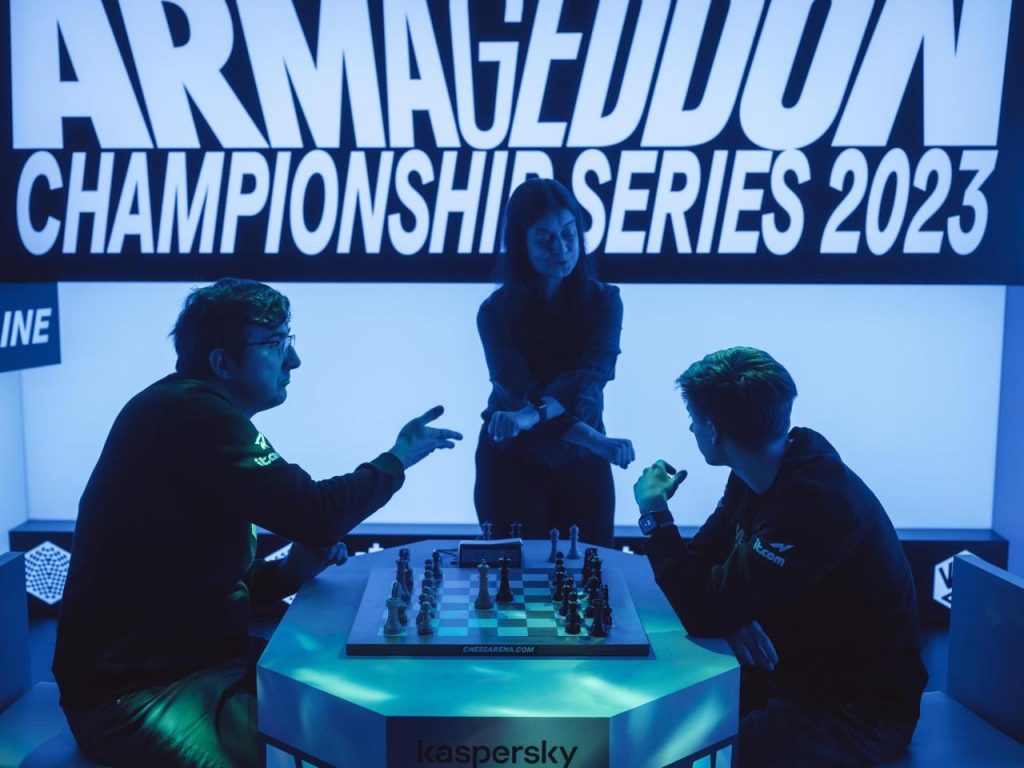
10. You are the Secretary of ECU Arbiters Commission, what positives have you taken from the FIDE ARB Commission into ECU ARB Commission?
I am fairly new at the office, I have been Secretary of the ECU AC for a little more than one year. I would say that we mostly have common goals with the FIDE Arbiters’ Commission, raising the level of the arbiters in our scope, appointing and rotating our colleagues in various events, ensuring female presence, organising seminars, publishing articles on interesting topics, advising on regulations etc. The FIDE ARB’s job is definitely more challenging than ours, they work with arbiters from four continents, all in different conditions, backgrounds, skills and experience. I would say that European arbiters are privileged because of the number and size of international events that are organised every year. Also, because of the geography of the continent, travelling is much easier.
Nevertheless, the main difficulty is common for the ECU AC and the FIDE ARB, too many arbiters, too little tournaments. It is not possible to appoint everyone and we need to know the skills of our colleagues, evaluate and select. Our tool in this process is the Call of Interest that we launch near the end of each year to help in the selection of arbiters for the next year. We have a grade system in place and we take into consideration the applicants’ skills, knowledge, experience and preferences. We appoint 20% of the match arbiters in every European event and we would like this quota to go higher in the future.
Last year, we made a radical change in this system, dividing the applicants in 3 lists: one open where everyone is included, one for women and one for arbiters who have never been appointed in Continental or World events before. Wherever we can appoint only one arbiter, they are selected from the open list. If we can appoint two, we select one from the open and one from the women’s list and, if we can appoint three, we add one from the “rookies” list. We had some very good results in 2023 from this process.
11. We have seen the likes of Sava Stoisavljevic as Chief Arbiters at World Chess Olympiads 2010 before. When are we likely to see another Female Chief Arbiter at the Olympiads?
I strongly believe that the level of female arbiters is very high nowadays. Skills like knowledge of the Laws of Chess, handling equipment (clocks, electronic boards, pairing software, anti-cheating tools) and team management manifest themselves equally in female and male arbiters. Women have a strong voice and are respected by the vast majority of the chess community. I would be delighted to see again a female Chief Arbiter in an Olympiad and I think that it will not take long for it to happen.
Enjoy every last bit of it! It will not be easy, but it is totally worth it!
Tania Karali
12. In conclusion, how has been your journey as an arbiter and how can you encourage others (women) to join arbitration?
My journey so far has been a wonderful adventure of travelling, meeting new people, broadening my horizons, working with players of all levels and origins and making sure they are playing in the best possible conditions. It is not easy to follow this path, but anything is possible, if you are passionate about it and willing to try and give your best self.
Some advice that I have been given and try to follow:
– Always be observant of your games. Even if you have an excellent knowledge of the regulations and Laws of Chess, you cannot act properly in any situation, if you do not know what exactly happened.
– Go to as many seminars as possible. You will get invaluable experience from colleagues who share incidents from their tournaments.
– Study the Laws of Chess, but do not be afraid to ask for advice. When in doubt, seek the help of the Chief Arbiter or more experienced colleagues.
– Contact organisers and ask to be appointed in their tournaments. Let them know about your skills and experience and that you are interested in being an arbiter in their event. In order to invite you, they need to know that you are interested and available to go.
– Enjoy every last bit of it! It will not be easy, but it is totally worth it!
Prepared by IA Chanda Nsakanya
